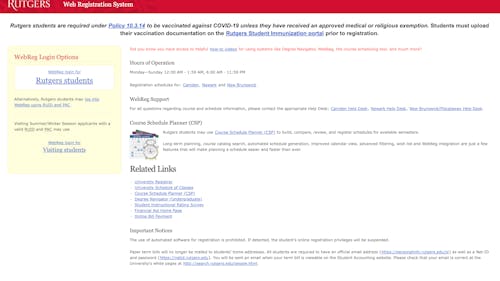EDITORIAL: Rutgers must create more user-friendly platforms for course scheduling
As students begin registering for next semester, issues abound with WebReg

This week, students at Rutgers began making their schedules for the upcoming semester. This process can be daunting as students have to ensure that they are meeting all of the requirements for their major, for the University or for any program they are involved in. There are a lot of requirements that students need to keep in mind when they craft their schedules.
Students might ask themselves: What happens if I cannot get into this class? Or what happens if this section fills up? What if I do not graduate on time? These concerns are real, and they have a significant impact on their academic careers.
Students might become more anxious around this time of the semester, especially because if there is a mistake in scheduling, their entire four-year plan for college might be derailed.
All of these issues are made worse when the system does not work properly. Imagine: You get up at 8 a.m. to schedule your semester, and you get locked out or the system crashes.
Now, when the system allows you to register, courses might have already been filled, and you are left stranded and forced to create a new schedule. Although you might be able to ask for special permission numbers, there is no guarantee that you will receive one. To address these issues and make the student experience better, Rutgers needs to examine and update our online system, known as WebReg.
WebReg is an incredibly important interface for students. The system is how we build our schedules — it is critical software and is something that can make our lives as students either easy or extremely difficult. WebReg does have some redeeming features, like the Course Schedule Planner that allows students to build a schedule before registration begins. Still, other elements of the platform tend to make students’ lives harder instead of easier.
The biggest challenge for students using WebReg is the platform’s inability to handle surges in student usage, exactly the type of surges that happen during peak scheduling hours. The platform crashes or students cannot even access the site in the first place.
Rutgers should investigate ways to build a better infrastructure so that these issues do not occur frequently. But, perhaps more importantly, Rutgers ought to consider how to better manage the timing of when students have access to WebReg.
Instead of having all students with a certain credit amount be able to schedule at 9 a.m., it might be better to have a system wherein, for example, all Class of 2023 students with a predetermined number of credits can schedule at 9 a.m., all Class of 2024 at noon and so on.
Another issue, for students, is that of prerequisites. Some core classes, for instance, require prerequisites that students would not necessarily know about. Prerequisite requirements must be made clearer so that students do not intend to register for a class only to realize that they cannot.
Even more, there should be clearer signage about what classes count for what core requirements or any other University-based requirement not directly connected to a student’s major.
Making course changes in WebReg is also a challenge. Students sometimes need to put in placeholders, which complicates their schedules. It would be wise for the University to make WebReg more flexible in terms of planning courses.
Placeholders are not easy and students usually need to add or drop courses temporarily as they wait for things to change.
Especially as we continue to exist in this virtual space in the aftermath of the pandemic, Rutgers should be taking the steps to strengthen online platforms so that students can create schedules easily.
As students at Rutgers, we should do our due diligence so that our lives are as easy as possible. As stated above, WebReg does have the Course Schedule Planner, which allows students to build a schedule before registration begins, save it and then register for that schedule directly. This option is a great opportunity for students to plan ahead and make scheduling easier for themselves.
As a result of how unfriendly WebReg can sometimes be, some students have taken matters into their own hands and created platforms that are user-friendly and make students' lives so much easier. Rutgers students should look into sites such as Scarlet Navigator, which is free, open source and designed to help students. Course Sniper is another helpful alternative.
Scheduling is always a challenge. It is stressful as students need to contend with an array of issues from prerequisites to getting into sections they want. That being said, Rutgers should make the process as easy as possible, which begins by improving interfaces that make scheduling unnecessarily complex.
The Daily Targum's editorials represent the views of the majority of the 154th editorial board. Columns, cartoons and letters do not necessarily reflect the views of the Targum Publishing Company or its staff.



